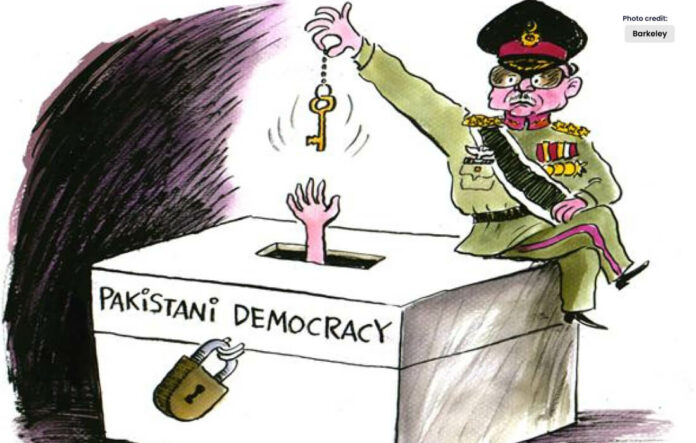The best way to test country’s democracy is through general elections.
The question arises whether Pakistan democracy will survive. Pakistan’s recent infamous polling system points to a serious malady.
But many pro-democracy Pakistanis believe that we have found a possible cure for this disease in the form of youth voters.
The local and international media have a clear view that despite all the electoral restrictions, the candidates supported by Pakistan Tehreek-e-Insaf (PTI) won thanks to the young voters active on social media.
Election campaigning through Tik Tok videos and artificial intelligence has exposed elite institutions and their vested interests.
Ahsan Iqbal termed the election results as a ‘rebellion of the youth against traditional politics’ and urged ‘to make room for the old parties in their organizational structure in this regard’.
But is the decline of democracy somehow linked to ethnicity? In some respects, the youth played a key role in these elections because the average age of our current country’s population is 22.7 years and 56.8 million eligible voters were under 35 years of age this year. But did our young voters seem coherently mobilized?
Elections end the excitement and suffocation. In this year’s elections, an element of resistance has emerged, which is similar to Imran Khan’s politics of anarchy.
Have young people challenged political actors or institutions through their right to vote? Or do their votes indicate political mobilization in policy development, institution building and service delivery?
But these indications do not give rise to any hope. First of all, the key issues like inflation, education and employment of the youth have not been given the attention they should have been given in the manifestos of the political parties. Young voters will be disappointed by the lag in service delivery.
Pakistan Institute of Development Economics
Undoubtedly, they may have exercised their right to vote, but over the past few years, young voters have been expressing what they want from the system through their votes.
Last year, a survey conducted by the Pakistan Institute of Development Economics revealed that 67 percent of the youth want to leave the country to seek employment.
Between 2021 and 2022, the number of Pakistanis leaving the country increased three times, while last year also saw an increase in this trend.
The electoral fervor of the youth is also inconsistent with Pakistan’s political economy and structural challenges that must be addressed for the sake of democratic values.
A Voice of America poll before the election found that 74 percent of young voters trust the military, while 58 percent rank the Supreme Court as the second most trusted institution. Such trends can hardly lead to an end to the status quo.
Research by the University of Cambridge’s Center for the Future of Democracy may help shed light on the trend of youth in these elections.
The 2020 Youth and Satisfication with Democracy report (which maps global trends) found that 18- to 34-year-olds had the fastest decline in trust in democracy, while those born between 1981 and 1996 55% of people expressed dissatisfaction with democracy.
The failure of democratic governments to deal with unemployment, unequal distribution of wealth and other forms of ‘economic exclusion’ led many to adopt this view of democracy.
Another interesting point the report points out is that countries with the most populist (popular) leaders like Imran Khan saw a 16 percentage point drop in trust in democracy among voters under the age of 35 during the first few years of their most populist leader’s tenure.
Confidence in Democracy
The report also revealed that the increase in youth confidence in democracy during the tenure of populist politicians was short-lived as it gradually declined after four years and rapidly declined after two terms of government.
There was a decline in confidence. In other words, populists either resort to authoritarian behavior to stay in power or they abuse power to succeed as mainstream politicians, thus losing the support of the youth and democracy. has to suffer again.
The behavior of Imran Khan and his supporters in the opposition will influence the political motivation of the youth, but it is feared that it will become more complicated.
It would be a shame for all the parties and the so-called pioneers of democracy not to take meaningful steps to sustain youth participation in politics.
We need more data to better understand political trends in Pakistan’s demographics. This data should include an assessment of how young people are politically active beyond voting.
The use of social media, everything from protests to consumer boycotts should count as it will help in figuring out how to keep the youth connected to it all. We should also give importance to the discussion that the youth is not a block that does not accept new ideas.
Grassroots situations shape the minds of young voters differently. Participation in grassroots, local government institutions, is likely to be an important step in keeping youth politically active.
Also read this: What will be the Destination of Independent Candidates this Time?




